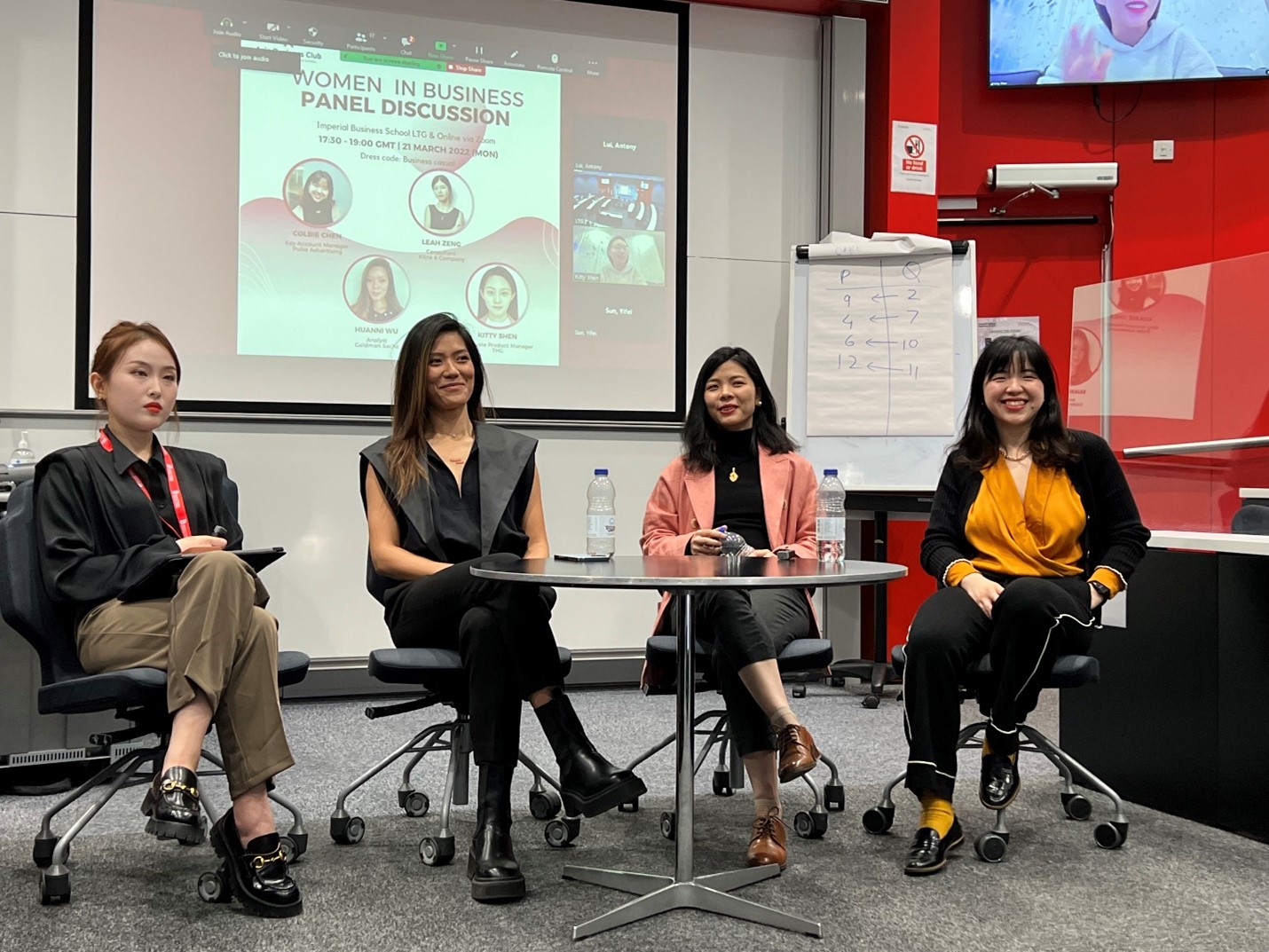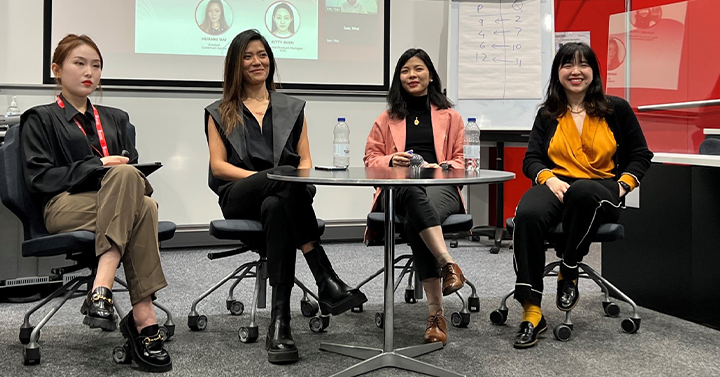Breaking barriers, challenging tradition, and exceeding expectations – Kline Consultant Liya Zeng talked about all that, and much more, as a panelist at the ICBS Asia Business Club’s discussion on “Women in Business” last week.
The group, which provides resources and networking opportunities for students interested in business topics and career opportunities in Asia, exists under the umbrella of Imperial College Business School (ICBS) in London, from which Zeng received an M.S. in Management. And, as she detailed during the panel discussion, her road to higher education – and the life she wanted to lead – wasn’t exactly a smooth one.
“I’m from a very small town – like a Tier-6 town – in Guangdong Province in Mainland China, and my family is quite traditional,” recounted Zeng, who now lives in London. “In traditional Asian families, girls are told what they can do and what they cannot do.” The “can’t do’s” included things as benign as whistling in public (it wasn’t “ladylike”), while the “can do’s” included learning to cook (after all, a girl would someday have to take care of a husband and children).
With such limited plans for Zeng’s future, it may come as a surprise that her family had little issue with her desire to attend college (but just wait – there’s a catch). At first, Zeng enrolled at a pharmaceutical university as a nursing major before swiftly realizing her interests lay in business. But in China, a change in studies isn’t easy.
“I couldn’t transfer to any other program except one – it was an exchange program focusing on international marketing,” she recalled. Her first three years of college would take place in China, and the last would occur in the United Kingdom – a prospect that brought its own set of challenges.
A WHOLE NEW WORLD
“I had been in a small town for the first 20 years of my life,” Zeng said. “I hadn’t been to any other country – I hadn’t even been to any other province. I’d never traveled anywhere. And, of course, my parents didn’t believe it was okay for a girl to travel alone.”
But travel alone she did. During her studies in Leicester, Zeng followed the path of management consulting after being inspired by a professor; after graduation, she stayed in the U.K. for an accounting internship, then went back to China for another internship at Deloitte Consulting. Along the way, she decided that a master’s degree would be imperative to obtaining work as a consultant, so she began “secretly” applying to programs.
Why the covertness? Zeng said she knew her parents would oppose her intentions because a master’s would be overkill; while they supported her endeavors to obtain an undergraduate degree – remember that catch? – they didn’t think she’d actually use it.
“My dad was fine with an education, but he said that a career isn’t important,” Zeng recalled. “He said, ‘You should just get a guy and get married – that’s the most important thing.’ And I said, ‘Even if I get married, I still need my career, right?’ And he said, ‘You don’t have to. If you marry a man who is rich enough, you can just be a housewife.’ That’s the kind of environment a lot of Asian females grew up in.”
Before long, though, Zeng’s father came around and endorsed her pursuit of a master’s in the U.K.; her mother, not so much.
“She told me, ‘If you were a boy, I would support you – but you are a girl,” Zeng remembered.
Tough words, but they caused no acrimony. “In China – or maybe South China – parents are more willing to invest in boys rather than girls,” Zeng said. “It’s very hard to blame my parents for how they felt, because they grew up in that environment. I understand them, and I know where their beliefs come from.”
WOMEN SUPPORTING WOMEN
Despite her mother’s objections, Zeng headed for Imperial College. She got her master’s degree and, in July 2019, was hired as a consultant in the Energy practice of Kline & Company. Immediately, Zeng knew she was at the right place.
“I’ve got two bosses who are female. Kline is very good on that end – or I’m just lucky with Yana and Annie,” Zeng said, referring to Vice President of Energy Yana Wilkinson and Vice President of Energy Management Consulting Annie Jarquin.
Probably a little of both: As we proudly touted on International Women’s Day earlier this month, 54% of Kline’s top leadership is female, and a full 100% of Kline’s industry verticals are led by women.

It was Wilkinson, in fact, who once helped Zeng over a major hurdle in her life – a story she recounted at the “Women in Business” discussion when asked how she balances her career with family.
“My mom was not well last year – she needed a major operation – so I was struggling a bit,” Zeng recalled. “I wanted to go back to China to take care of her. Yana supported me. She said, ‘Yes, you should go.’ So in the end, I managed to get to China for five months to stay with my mom, and I continued working, remotely, until she recuperated.”
With such strong female support, Zeng told the ICBS audience, she felt immediately welcomed as a female professional. And despite initial trepidations about being a newcomer in London, Zeng said the capital of the U.K. turned out to be “a very diverse city where there’s a lot of inclusion, and people respect each other.” Instead, perhaps surprisingly, she said her biggest challenges come from the person you might least expect: herself.
‘WE NEED TO CHANGE THAT MENTALITY’
“It was not easy for me to change my mindset, personally, to go from a girl to a businesswoman,” Zeng said. “In Asian culture, we were taught that you should not be too aggressive, and that influenced me. At first, I was relatively quiet – I thought that I had to observe what other people were saying, what other people were thinking, instead of talking myself. Even now, I sometimes have trouble when I want to speak up; I’m still learning to overcome this mental barrier. And I want to encourage everyone who has had similar experiences to be brave, to challenge traditions and challenge that mentality.”
“Women are never alone in this mental dilemma – a lot of us deal with it,” she continued, before noting that even her Kline contemporaries have had challenges working in the Energy sector, which is predominantly male. “Yana and Annie are my role models – they’ve shared their own stories with me. They had to make a lot of effort to achieve what they have today.”
Zeng has help other than that from Wilkinson and Jarquin.
“I’m reading a book called Nice Girls Don’t Get the Corner Office. In it, the writer gives a model,” she said, before laughing at her use of the word “model” and noting that it comes from her consultant’s mindset. “There are four main steps in the writer’s model, and the first step is being aware. The first step for change is always awareness. And now I’m aware of my own behavior and thinking, so I can gradually make more changes. I look forward to implementing all of them – making myself an experiment and seeing many more changes in me and my career.”
And with that evolution, the girl who was once forbidden to even whistle is singing a happy tune – all while ensuring that she shares everything she’s learned with other women. In fact, she’s on the executive committee for Chinese Women in the City (CWIC), a non-profit organization of 500+ members that empowers female professionals of Chinese heritage. She also established a club called Chinese Consultants in the U.K., which has 100+ members of Chinese consultants working in the management/strategy consulting area.
“Our events focus on the challenges women face in the business world, how to empower women, and how to fit in despite cultural differences and gender issues,” Zeng said. “And most of all, we talk about how, someday, we’ll finally break the glass ceiling.”

